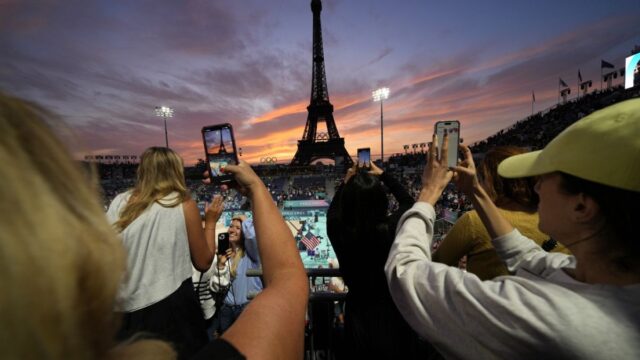It is through the lens of his camera that photojournalist José Sena Goulão shines, making others shine. Photography is not a sport, but an art that also carries a gold medal.
Filipa Martins made history by becoming the first Portuguese gymnast to reach an ‘All Around’ artistic gymnastics final at the Olympic Games. This moment was witnessed by everyone through video images from Paris and the photographs that capture the perfect moment.
This image was taken by José Sena Goulão, who witnessed firsthand how history was made. An exciting moment for all Portuguese people and even for the Portuguese photojournalist, who covers his first Olympic Games.
“These are my first Games and for me it is a childhood dream to be here. I was an athlete in gymnastics and other things, but especially gymnastics, and I thought that one day I would be here (…). This is really “the peak of what I could do in my career”explained José Sena Goulão to ‘Euronews’.
Works for the Portuguese national news agency Lusa and his work focuses on athletes from Portugal. “If athletes do not win medals or are not in the top positions, their images do not usually appear in foreign media. So that is our job, to make sure that the Portuguese media has our images and that’s it. Of course the impact is always great,” he said.
An impact that does not remain on the front pages of newspapers, since the photographs captured by the professional are widely used on different platforms and shared on social networks. “In regards to Instagram and what I have to give, yes, the feedback has been incredible, really incredible.”
In addition to his professional commitments, the photojournalist He takes advantage of some free time to photograph himself and feed the channels that also give life to his work.
“Everything else I do on my own and for take advantage of the opportunity to be here with thebest athletes in the world. It doesn’t happen every day, so I have to try to do as much as possible,” he says, emphasizing how physically exhausting the job can be. “I would like to have more time to do all the editing and publishing more things every day, but it is very exhausting. There are many hours traveling from here to there, many hours in transportation, with our material that is very heavy all day. It’s a marathon a test of endurance“.
In his first experience covering the Olympic Games, he considers himself “a child in a toy store“, otherwise it would not be the biggest sporting event in the world.
Light, camera, action… and emotion
It is not easy to define the perfect photograph nor determine the most successful shot among several. “I think there are ways to differentiate it, but, for example, speaking specifically about Filipa. The whole sport is incredible, very photogenic, the movements are graceful, the light is beautiful, everything comes together so that the images come out well,” explains the photographer. , adding that all these details may not be enough to guarantee a distinctive photograph.
“Now you have to add emotion to the images, especially in his expression, and you could see that he got excited when he hit his chest, when the solo finished and he got excited because he knew it was probably going to happen. The look on his face when he’s on the beam, I think that’s it.”
Strong emotions can define legendary photographersin a job that may be easier or more difficult in an unpredictable event like the Olympic Games.
“For example, yesterday I went to ‘play’ a little fencing and I have never seen anything so intense. Because with each point they shout and there is an atmosphere in the pavilion, with each thrust you have I don’t know how many images of emotion when the masks are removed. Is incredible.
“We photograph from where we can and not from where we want”
Vasco Vilaça and Ricardo Batista have won two Olympic diplomas for Portugal in triathlon and the moment of the hug between the two was captured by José Sena Goulão, who work with the limitations of a large event.
“There are events that I have never photographed in my life. I did the women’s race, it was like this, like that. Then in the men’s race, I knew exactly where to place myself, it went well. You always need a little knowledge of what you are doing“explained the photojournalist.
There are several factors that can determine whether or not the desired photograph is captured. In the Olympic Games, we are talking about a huge event and often unpredictablein which hundreds of photographers from all over the world work. “We shoot from where we can and not from where we want,” states the Portuguese photojournalist, explaining that this is something that can affect your work.
“When it comes to knowing if it is a photo that is going to be widely shared, it is also the combination of photo and news. It’s normal for things to happen. “Sometimes there are many photos that are nice, but if the event does not have an impact on people, the photo is overlooked,” he said.
“And that’s what happened. They (Vasco Vilaça and Ricardo Batista) shone in the triathlon and so did Filipa. So they are the two things combined which give dimension to the image“.







